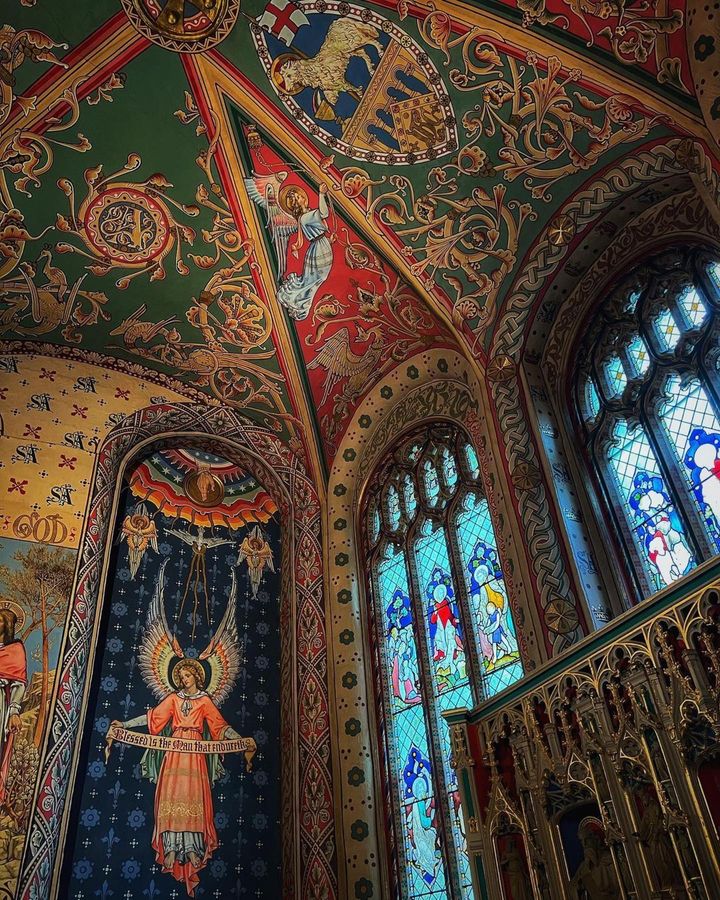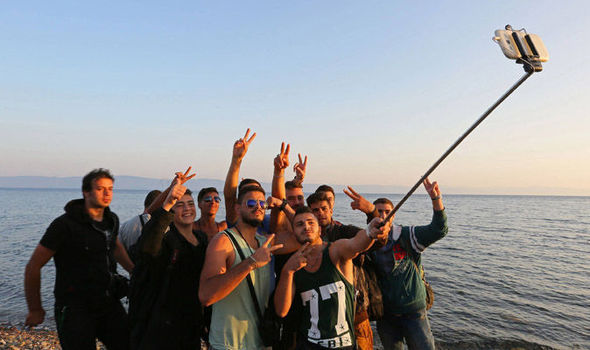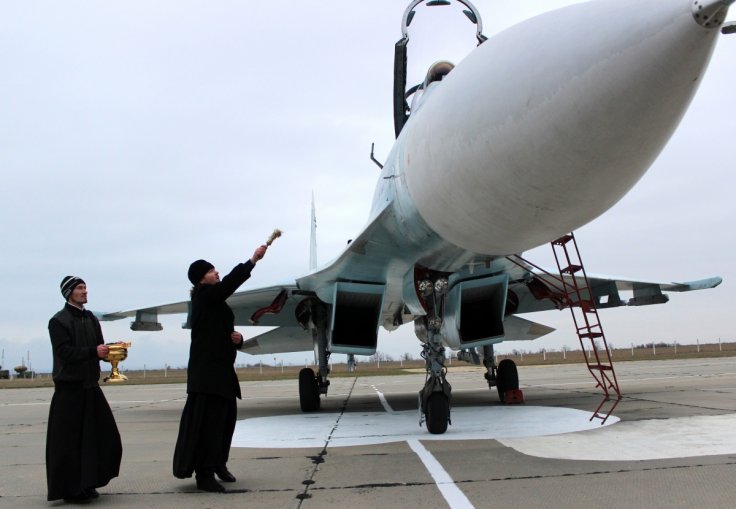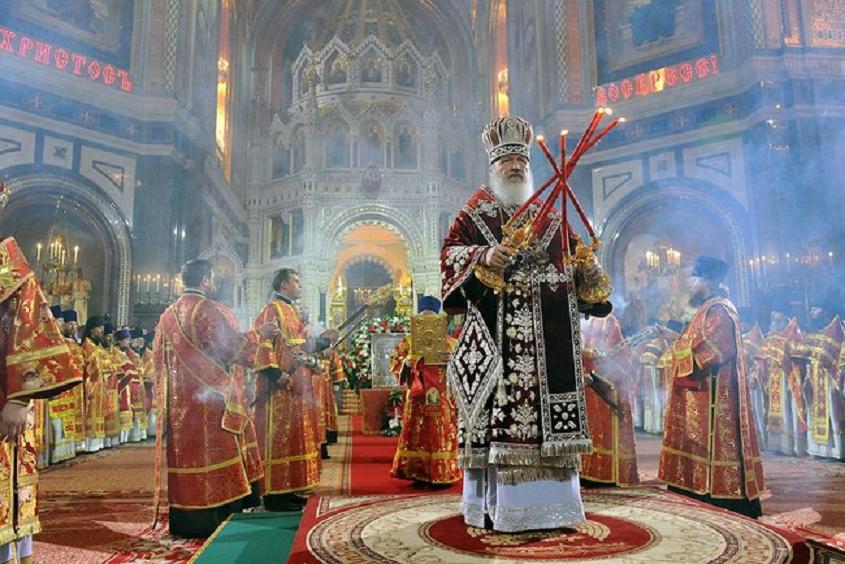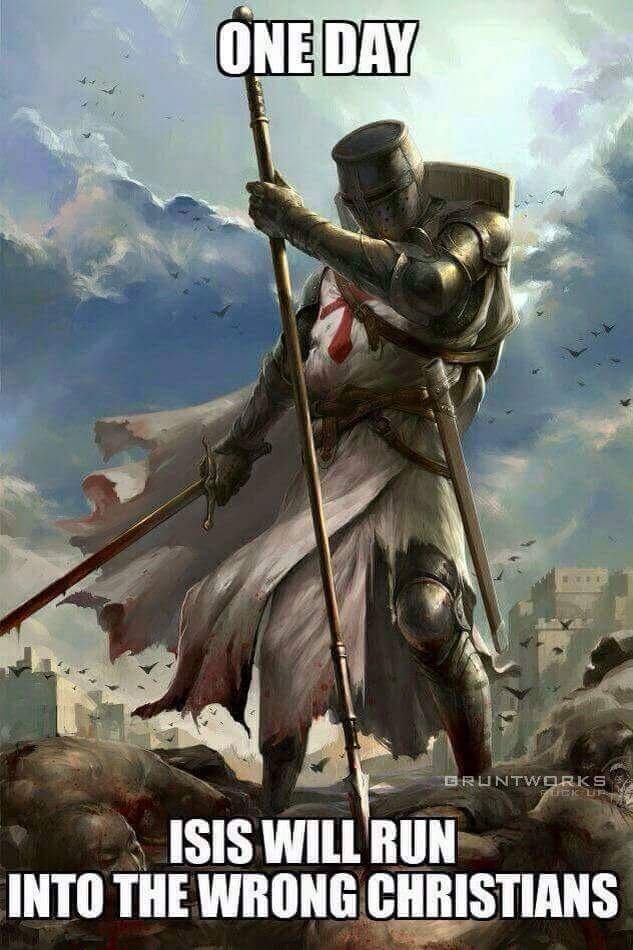The Church Impotent: The Feminization of Christianity
 Embryo Parson Posted on
Embryo Parson Posted on  Sunday, October 4, 2015 at 04:51PM
Sunday, October 4, 2015 at 04:51PM A Picture is Worth a Thousand Words
 Embryo Parson Posted on
Embryo Parson Posted on  Saturday, October 3, 2015 at 04:47PM
Saturday, October 3, 2015 at 04:47PM Moorman on the Puritans and the Caroline Divines
 Embryo Parson Posted on
Embryo Parson Posted on  Thursday, October 1, 2015 at 11:42PM
Thursday, October 1, 2015 at 11:42PM “(The Puritans), less well informed than the Anglicans, . . . could not understand what these scholarly men were trying to do. Because the High Churchmen stood out for episcopacy as essential to catholic order they accused them of wanting to restore the papacy; and because they fought for the beauty and order in worship, for loyalty to the Prayer Book, for the offering of a liturgy worthy of a great Church, the Puritans thought they wanted to bring back the Roman Mass. The Caroline Divines, therefore, found themselves out of sympathy with the Puritan party which was rising to power, and many of them suffered during the troubled years. But by their sound scholarship, their courage, the purity and sanctity of their lives, they saved the Church of England from destruction and laid the foundations upon which later generations could build.” John Moorman, "History of the Church in England"
Two Recommended Articles on Anglican Catholicity
 Embryo Parson Posted on
Embryo Parson Posted on  Thursday, October 1, 2015 at 02:49PM
Thursday, October 1, 2015 at 02:49PM The Anglican Mind in Caroline and Tractarian Thought, Canon Arthur Middleton
WhyThe Parish?, Fr. Lee Nelson
ACNA, the Russian Orthodox Church and Romans 13
 Embryo Parson Posted on
Embryo Parson Posted on  Thursday, October 1, 2015 at 01:34PM
Thursday, October 1, 2015 at 01:34PM Let's hope that the warm relations recently struck between the ACNA, and OCA and the ROC don't chill in the wake of the ROC's pronouncement that Russia's war against ISIS is "holy." Already, over at the ACNA Facebook page, the pacifists and the theologically challenged are having a hissy-fit over the ROC's statement. I was sort of hoping that the new ecumenical bonhomie between the ROC and ACNA might disabuse the view of certain ACNA clergy that "violence is never the answer." We shall see.
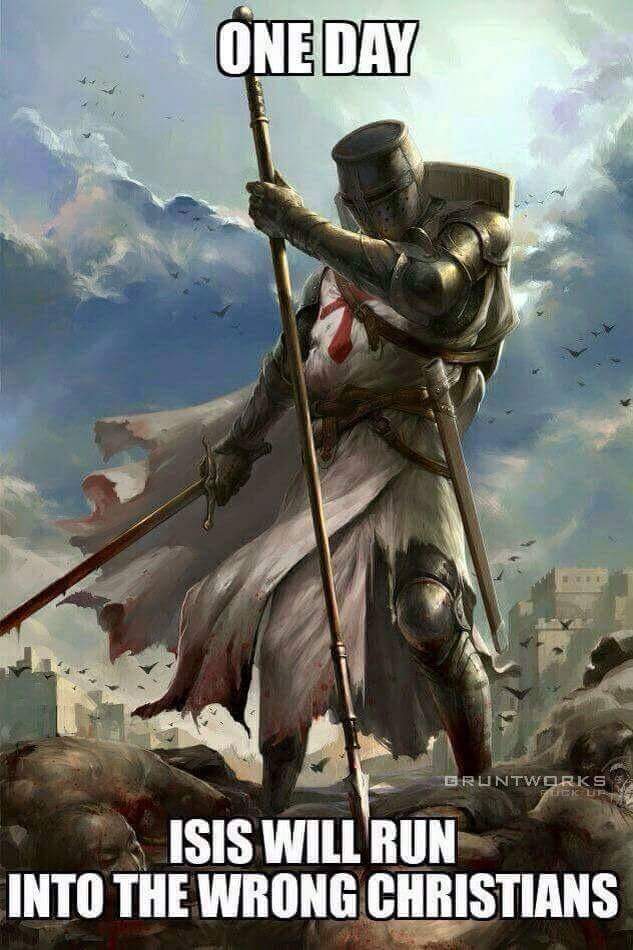
Muscular Christianity
 Embryo Parson Posted on
Embryo Parson Posted on  Thursday, October 1, 2015 at 01:59AM
Thursday, October 1, 2015 at 01:59AM Christian Resistance Theory: The Catholic Second Amendment
 Embryo Parson Posted on
Embryo Parson Posted on  Wednesday, September 23, 2015 at 03:59PM
Wednesday, September 23, 2015 at 03:59PM Another must read by Second Amendment scholar David Kopel.
Scholars of the American Revolution and of the Second Amendment are used to looking at the closest intellectual ancestors of the Founders—especially at John Locke and Algernon Sidney, and also at the many other English authors from the sixteenth and seventeenth centuries who articulated a right to armed revolution in order to vindicate the natural right of self-defense. Although King George III reportedly denounced the American War of Independence as “a Presbyterian rebellion,” it seems that American principle of justified revolution has very strong Catholic roots. When Pope Gregory launched the Papal Revolution, he had no idea that there was an American continent, let alone that he was unleashing ideas which, after centuries of development, would mature into an American Revolution. One of the values of understanding the debt that the Declaration of Independence and the Second Amendment owe to the Summa Theologica, to Policraticus, and to the other great works of Catholic resistance theory is that we can better understand that the American principles of revolution and the right to arms are not novelties that spontaneously arose in 18th-century America or in 17th-century Great Britain. Rather, they are the natural results of an intellectual tradition that was in many ways far older and broader—and much more Catholic—than the American Founders may have realized.
Christian Resistance Theory: John of Salisbury
 Embryo Parson Posted on
Embryo Parson Posted on  Monday, September 21, 2015 at 01:02PM
Monday, September 21, 2015 at 01:02PM Lex iniusta non est lex - St. Augustine
A few days ago I promised some further comments on Christian resistance theorists from the Middle Ages. Oftentimes when I make comments such as the one I made in the previous post, I get blank stares and embarrassed silence, especially from fellow clergy. The assumption seems to be that since Jesus promised us tribulation in this world, a passive, pacifist response is what is required from all Christians who suffer persecution. No Christian, and certainly no clergyman according to this view, should ever defend the argument for the propriety of armed resistance against tyranny. As Archbishop Foley Beach recently put it in a comment designed to honor Martin Luther King, "Violence is not the answer. Violence only leads to more violence. It is non-violence which brings lasting social change".
As you can see in the linked blog article, my answer to that was, "Archbishop Beach's comment is flat wrong when viewed in a biblical and Christian-historical contexts. Plus, it's just flat wrong empirically. The Orthodox Serbs and Greeks will tell you that their violent resistance against the Ottoman Turks brought lasting social change to their lands." I'm sure Archbishop Beach would also agree with the proposition that violence was indeed the right answer to Adolf Hitler. (I choose to give His Grace the benefit of the doubt and speculate that his words represented a "throw-away" comment designed to say something politic about MLK on his national day of celebration.)
Moreover, the Christian resistance theory that was developed by certain theologians in the West, and more or less embraced in the East, was developed by clergy, mainly bishops. One such bishop was the Anglo-Saxon John of Salisbury, Secretary to the Archbishop of Canterbury, Bishop of Chartres, and author of an important political treatise, Policraticus, in which the bishop, echoing the political thought of Manegold of Lautenbach and foreshadowing that of Thomas Aquinas, argued for the right to revolution against tyranny, a proposition that stands at the center of American political theory.
My good friend David Kopel, with whom during my gun rights activism days I co-authored a law review article on the right to keep and bear arms, penned this article about John of Salisbury. I highly recommend it to all my Christian friends, especially my fellow clergy who think that Christian theology justifies the proposition, "Violence is never the answer."
Consider St. Augustine
 Embryo Parson Posted on
Embryo Parson Posted on  Sunday, September 20, 2015 at 10:28PM
Sunday, September 20, 2015 at 10:28PM Who, following St. Paul in his doctrines of grace, was just as Protestant as Luther and Calvin, but in his mysticism, ecclesiology and sacramentology was just as Catholic as those who preceded the Reformers.
That should be our aim as Anglicans. We are not Presbyterians with prayer books.
What Was the Oxford Movement?
 Embryo Parson Posted on
Embryo Parson Posted on  Saturday, September 19, 2015 at 05:09PM
Saturday, September 19, 2015 at 05:09PM Were (the Church of England's) pastors priests of the Catholic Church (as the Prayer Book insisted) or ministers of a Calvinistic sect?
Pretty much the central question to be answered for the purposes of settling the issue of Anglican identity, is it not? My answer is that is that our pastors are in fact priests of the Catholic Church, not ministers of a Calvinistic sect, BUT that Anglicanism at least makes room for certain doctrines that came to be associated with Calvinism. Said doctrines are not necessarily "Calvinistic", however, as they antedated him, in certain cases by a thousand years.
We are not Presbyterians with prayer books, however, and the English Reformation didn't end with the Settlement. Hooker and the Caroline divines are as important to classical Anglicanism as are Cranmer and Jewell, and what's more, I don't believe we can ignore the Tractarian legacy in our attempt to articulate Anglican identity.
Advice
 Embryo Parson Posted on
Embryo Parson Posted on  Monday, September 14, 2015 at 11:25AM
Monday, September 14, 2015 at 11:25AM From Christian philosopher and apologist Doug Groothuis:
Advise (sic) from a long-time curmudgeon, philosopher, and social critic.
1. Develop your theology of suffering.
2. Develop your theology persecution.
3. Develop your theology of martyrdom.
4. Develop your theology of civil resistance.
You will need all four--soon.
Only if you live in the Middle East and perhaps Western Europe, says I.
Here in the United States, persecution of Christians is against the fundamental law of the land, and if that law is ever set aside or systematically ignored by the liberal state, then the people may - and likely will - take that state down, by force if necessary. That's 18th-century American political philosophy, folks, and it's more or less enshrined in law. Stop wringing your hands. Yes, develop your theologies of suffering, persecution and martyrdom, but as you develop your theology of civil resistance:
1. Develop your understanding of Anglo-American constitutional history. Then:
2. Develop your defiant, steely resolve.
3. Develop your stash.
4. Develop your marksmanship skills.
5. Develop your local connections, and cry . . .
For some further thoughts on some medieval Catholic theologians who are known for their work on Christian resistance theory, see:
Christian Resistance Theory: John of Salisbury
Another Anglican Making Sense on Immigration
 Embryo Parson Posted on
Embryo Parson Posted on  Sunday, September 13, 2015 at 09:42PM
Sunday, September 13, 2015 at 09:42PM A Christian's call to halt mass Muslim migration to Europe, by Gavin Ashenden.
Previously: When Anglicans Make Sense.
Russia and the West Have Swapped Spiritual and Cultural Roles
 Embryo Parson Posted on
Embryo Parson Posted on  Thursday, September 10, 2015 at 08:31PM
Thursday, September 10, 2015 at 08:31PM I'm not sure I can be quite as sanguine as this writer, for I suspect there is more here than meets the eye. There are some things about the situation in Russia that give me pause. That said, what's happening in what Samuel P. Huntington called the "Orthodox Bloc" has me very intrigued. And hopeful.
My readers know how important the issue of "muscular Christianity" is to me. Eastern Orthodoxy is muscular Christianity.
I'd like to think that orthodox Anglicanism can rival the muscular Christianity of Orthodoxy. I believe it can, but it has some doin' to to in order to get there.
"Islamophobes" 'R' Us
 Embryo Parson Posted on
Embryo Parson Posted on  Tuesday, September 8, 2015 at 04:45PM
Tuesday, September 8, 2015 at 04:45PM Have you been branded an Islamophobe – a slur word invented by Muslim leaders and clerics against non-Muslims?
Then join the ranks of the world’s greatest political leaders, military leaders, writers, philosophers, historians, researchers and intellectuals; the movers and shakers of history.
This!!
 Embryo Parson Posted on
Embryo Parson Posted on  Tuesday, September 8, 2015 at 04:26PM
Tuesday, September 8, 2015 at 04:26PM From Martin Thornton:
Personal petition is the heart of prayer as corporate adoration is its peak. It is unfortunate that Protestantism tends so to stress the value of petition - "sincere prayer from the heart" - that it obscures its ultimate consummation in the corporate worship of the Church. It is just as regrettable that a certain type of Catholicism so emphasises the Office and the Mass that it overlooks a personal religion which alone guarantees adequate participation in them. - Christian Proficiency, p. 87.
Evangelical is not enough. Catholic is not enough.
When Anglicans Make Sense
 Embryo Parson Posted on
Embryo Parson Posted on  Sunday, September 6, 2015 at 04:49PM
Sunday, September 6, 2015 at 04:49PM Hitchens: We won't save refugees by destroying our own country
While Peter Hitchens used to be an atheist like his older brother Christopher Hitchens he became a Christian later in his life. Accordingly, he became a member of the Church of England and is now an advocate of moral virtues founded on Christian faith and institutions such as marriage. Today Hitchens defends the use of the Church of England's 1662 Book of Common Prayer and of the King James Bible. Of the latter, he has written "it is not simply a translation, but a poetic translation, written to be read out loud... to lodge in the mind and to disturb the temporal with the haunting sound of the eternal". He argues Christianity has been systematically undermined by social liberals and cultural Marxists. "The left’s real interests are moral, cultural, sexual and social. They lead to a powerful state. This is not because they actively set out to achieve one," Hitchens writes. "It is because the left’s ideas – by their nature – undermine conscience, self-restraint, deferred gratification, lifelong marriage and strong, indivisible families headed by authoritative fathers."- Wikipedia
A few days ago I posted this article, in which I criticize the Church of Rome, much of Evangelicalism, and orthodox Anglican leadership here in North America for their admittedly warm-hearted but ultimately reckless and biblically baseless stance on illegal immigration. Today Peter Hitchens chimed in, and I want to set him forth as an example of what real orthodox Anglican leadership looks like. Excerpts:
Actually we can’t do what we like with this country. We inherited it from our parents and grandparents and we have a duty to hand it on to our children and grandchildren, preferably improved and certainly undamaged.
It is one of the heaviest responsibilities we will ever have. We cannot just give it away to complete strangers on an impulse because it makes us feel good about ourselves. . . .
As William Blake rightly said: ‘He who would do good to another must do it in minute particulars. General good is the plea of the scoundrel, hypocrite and flatterer.’. . .
Thanks to a thousand years of uninvaded peace, we have developed astonishing levels of trust, safety and freedom. I have visited nearly 60 countries and lived in the USSR, Russia and the USA, and I have never experienced anything as good as what we have. Only in the Anglosphere countries – the USA, Canada, Australia and New Zealand – is there anything comparable. I am amazed at how relaxed we are about giving this away.
Our advantages depend very much on our shared past, our inherited traditions, habits and memories. Newcomers can learn them, but only if they come in small enough numbers. Mass immigration means we adapt to them, when they should be adapting to us.
So now, on the basis of an emotional spasm, dressed up as civilisation and generosity, are we going to say that we abandon this legacy and decline our obligation to pass it on, like the enfeebled, wastrel heirs of an ancient inheritance letting the great house and the estate go to ruin?. . . .
Can we stop this transformation of all we have and are? I doubt it. To do so would involve the grim-faced determination of Australia, making it plain in every way that our doors are open only to limited numbers of people, chosen by us, enduring the righteous scorn of the supposedly enlightened.
As we lack the survival instinct and the determination necessary, and as so many of our most influential people are set on committing a sentimental national suicide, I suspect we won’t.
To those who condemn reasonable calls for national self-defence as bigotry, hatred and intolerance (which they are not), I make only this request: just don’t pretend you’re doing a good and generous thing, when you’re really cowardly and weak.
Don't be content with this smattering of quotations. You need to read the whole article.
From His Mouth to God's Ears
 Embryo Parson Posted on
Embryo Parson Posted on  Wednesday, September 2, 2015 at 11:26PM
Wednesday, September 2, 2015 at 11:26PM The Imminent Decline of Contemporary Worship Music: Eight Reasons
Thankfully, my own generation is beginning to die. While ostensibly created “for the young people,” the driving force behind contemporary worship music was always my own Sixties generation of anti-adult, anti-establishment, rebellious Woodstockers and Jesus freaks. Once my generation became elders and deacons (and therefore those who ran the churches), we could not escape our sense of being part of the “My Generation” that The Who’s Pete Townsend had sung about when we were young; so we (not the young people) wanted a brand of Christianity that did not look like our parents’ brand. Fortunately for the human race, we are dying off now, and much of the impetus for contemporary worship music will die with us (though the commercial interests will “not go gentle into that good night,” and fulfill Dylan Thomas’s wish).". . . .
"Contemporary worship" to me is an oxymoron. Biblically, worship is what angels and morning stars did before creation; what Abraham, Moses and the Levites, and the many-tongued Jewish diaspora at Pentecost did. It is what the martyrs, now ascended, do, and what all believers since the apostles have done. More importantly, it is what we will do eternally; worship is essentially (not accidentally) eschatological. And nothing could celebrate the eschatological forever less than something that celebrates the contemporary now. So ultimately, I think the Apostles’ Creed will stick its camel’s nose into the liturgical tent, and assert again our celebration of the “holy catholic church, the communion of the saints.” The sooner the better.
Do Orthodox Christians Believe in the Atonement?
 Embryo Parson Posted on
Embryo Parson Posted on  Wednesday, September 2, 2015 at 05:40PM
Wednesday, September 2, 2015 at 05:40PM Yes they do, argues Fr. John Whiteford. Nevertheless,
There are many contemporary Orthodox writers who wish to deny or downplay a number of concepts that relate to our redemption. They will argue we don't believe Christ had to die in our place, or that His blood needed to be shed to pay the penalty for our sins. They will deny the legitimacy of legal terms, in favor of the idea that the Church is a spiritual hospital. The problem is not that the Church is not a spiritual hospital, but rather that in emphasizing one set of images used to explain our salvation, they deny a whole set of equally valid images that are clearly Biblical. It is true that in the west there was an over emphasis on legal imagery, but the solution to such an imbalance is not a new imbalance in the opposite direction. We can and should speak of sin as an illness, but when we die, we do not go before the final medical exam -- we face the final judgment, which is a legal image if ever there was one. And so we can also speak of sin as a transgression of the Law of God, and of our need to be justified by God, even as we speak of sin in terms of an illness that we need to be healed of.
Fr. Whiteford goes on to argue that there is support in Orthodox divinity for something that at least resembles a penal, substitutionary view of the atonement:
St. Gregory Palamas, in his Sixteenth Homily (delivered on Holy Saturday: "About the Dispensation According to the flesh of our Lord Jesus Christ and the Gifts of Grace Granted to Those Who Truly Believe in Him"), speaks quite a bit about the need for Christ to die in our place. The entire homily is well worth reading, but here are some excerpts:
"Man was led into his captivity when he experienced God's wrath, this wrath being the good God's just abandonment of man. God had to be reconciled with the human race, for otherwise mankind could not be set free from the servitude. A sacrifice was needed to reconcile the Father on high with us and to sanctify us, since we had been soiled by fellowship with the evil one. There had to be a sacrifice which both cleansed and was clean, and a purified and sinless priest" (Christopher Veniamin, trans. Saint Gregory Palamas: The Homilies (Waymart, PA: Mount Thabor Publishing, 2009) p. 124).
"Christ overturned the devil through suffering and His flesh which He offered as a sacrifice to God the Father, as a pure and altogether holy victim -- how great is His gift! -- and reconciled God to our human race" (p.125).
"For this reason the lord patiently endured for our sake a death He was not obliged to undergo, to redeem us, who were obliged to suffer death, from servitude to the devil and death, by which I mean death both of the soul and of the body, temporary and eternal. Since He gave His blood, which was sinless and therefore guiltless, as a ransom for us who were liable to punishment because of our sins, He redeemed us from our guilt. He forgave us our sins, tore up the record of them on the Cross and delivered us from the Devil's tyranny (cf. Col 2:14-15)"( p. 128f)."
Fr. Whiteford concludes his article, essentially, with a call for "balance" between juridical and incorporationist views of salvation. Harmony between East and West, in other words.
Sound of wild applause.
We find an example of what Fr. Whiteford is criticizing in a recent article from Orthodox blogger Tim Holcombe entitled How We Are Saved.
To properly understand salvation, what it is, and how it is obtained, we must first address proper context. Any Christian should quickly agree that Christ our Savior provides the ultimate context, thus, it is beneficial for us to see what He taught to His followers.
A casual look at the Gospels show clearly that Christ founded His Church. His Church was built upon His commandments. Christ promised us that the gates of hell would never prevail against His Church. The Church is an ontological reality. It is the very Body of the living Christ, and the two cannot be separated, as Christ is the Head. This is why we say “find the Church, and you will find Christ.” This is why Saint Cyprian of Carthage wrote “outside the Church there is no salvation,” for Christ and the Church are eternally united. . . .
What most protestants believe is rooted in the teachings of Martin Luther and John Calvin. Salvation is more of a judicial act, ostensibly taking one’s case before a judge, pleading for mercy, and awaiting the verdict. They even use legal terms, such as “acquittal” and “justification.” . . . .
All these notions are a very far cry of the teaching of Christ on the matter of salvation.
To revisit the foundations, we must go to the beginning of our salvation. . . .
The event of the glorious Incarnation of Christ fulfilled the prophecies of Old Testament prophets, as Christ, the God-man came to the Earth, born of the Virgin Mary. He existed (and exists) both as God and man, a living example of what God had always intended. Protestants rarely speak of the Incarnation, because the act of salvation for them has been ultimately reduced to a mere formula, a one-time, quick judicial act. But the Incarnation was the coming in the flesh of Christ our God, the union of human and divine nature, which Adam enjoyed prior to the Fall. The Incarnation was the living, breathing example of what God intended, and intends for us. Christ serves as our example, the uniting of humanity with Divinity. The Church calls this process theosis, which is the process of a worshiper becoming free of hamartía (“missing the mark”), being united with God, beginning in this life and later consummated in bodily resurrection.. For Orthodox Christians, theosis is salvation. Theosis assumes that humans from the beginning are made to share in the Life or Nature of the all-Holy Trinity. As Saint Peter writes:
Whereby are given unto us exceeding great and precious promises: that by these ye might be partakers of the divine nature, having escaped the corruption that is in the world through lust. (2 Peter 1:4)
For the Christian, the crucifixion served not as Christ “paying the penalty for our sins,” rather, for the destruction of death, which was the consequence of the Fall. Christ conquered death by death. And after His death, he descended into Hades to restore our Father and Mother, Adam and Eve, and all peoples who dwelt there, as death had been conquered, thus restoring them to unity with God. . . .
Salvation is union with Christ. It is the saving and restoration of the whole man. It is not a mere past act, grossly minimized by the recitation of a simple prayer. Salvation is both past, present and future. It is a living, ongoing reality. For the Christian, Christ has saved us, is saving us, and will save us.
Salvation begins for us in the waters of holy Baptism, where our sins are washed away, and we are united to Christ. We reject all former delusions, and begin a lifetime process of repentance, turning from our fallen natures, and growing in Christ through obedience to Him. We participate in His very life, His Body in the Holy Mysteries which He has given to His Church. We partake of His Body and Blood at each Divine Liturgy when we receive Holy Communion. We repent of our sins through confession, and receive forgiveness and absolution. We pray, and fast, give alms, do good works which are profitable for our salvation, and receive encouragement by dutifully studying the lives of the Saints, observing how they obtained salvation by their exemplary lives of holiness. . . .
The Church (which maintains the promises and commandments given by Christ Himself, Who is the Head) properly sees sin as a disease of the soul, a disease which leads to eternal death. The disease is cured by full participation in the Church, the Body of Christ, and the partaking of the life-giving Mysteries contained therein.
So what we have here in Holcombe's presentation on salvation is exactly what Fr. Whiteford argues is, from what he believes is a true Orthodox perspective, an unbalanced view of the matter, which is to say merely the incorporationist (or "therapeutic") side of biblical soteriology to the exclusion of the juridical side. I notice as well how much Holcombe's view mirrors this one.
I've argued previously that this same lack of balance is manifested in much of Anglo-Catholicism, and that the cure for this is to fully embrace the Augustinian legacy. In my thinking, that includes the theology of Anselm of Canterbury on the nature of the atonement and all of its juridical implications, as well as that of Bernard of Clairvaux on grace and justification. Despite what Holcombe seems to be saying, those implications -- acquittal and justification -- are things that have clear support in the New Testament.
See A Reader Sends This Article.
(One more incidental point about Holcombe. While I obviously take issue with his argument here, he is one of my favorite political and cultural bloggers. He's a traditional Southron, and his stuff on the flap over the Confederate flag is priceless.)
Trouble
 Embryo Parson Posted on
Embryo Parson Posted on  Wednesday, September 2, 2015 at 02:59PM
Wednesday, September 2, 2015 at 02:59PM I won't be earning any points with many Anglican leaders with this post, but here goes anyway. To be read in conjunction with the post below:
Shock Poll: 59% Back Trump On Deportation of Illegals
Twenty percent of illegals caught at border have criminal records
No entry? Sweden’s far-right calls for vote on immigration, French want to shut borders
Hungary bars migrants from trains; smugglers wait in wings
Alien Invasion of Europe: Now a Deluge
EU faces crisis of "biblical proportions"
Czech President Calls for Army to Defend Border Against Migrants
Murder of elderly couple in Sicily fuels Italy's growing anti-immigrant sentiment
‘People in Europe are full of fear’ over refugee influx
The 'refugees welcome' fad will do more harm than good
More On The Alien Invasion of Europe
Islamic State Terrorists Caught Crossing Into Europe as "Refugees"
Without borders in Europe, there is no hope of ending this migrant crisis
What’s all the fuss about Germany?
Another Anglican Making Sense on Immigration
A Picture is Worth a Thousand Words
The Left's (and Right's) Dishonest Biblical Argument for Taking in Syrian Refugees
The Dangers of Refugee Humanitarianism
At some point, the Church - Roman, Orthodox, Anglican and Protestant - will be forced to find her tongue on this issue. I think I can accurately predict that she will have to do much better than spouting the kind of platitudes we've heard thus far from Rome, liberal Protestants and many Evangelicals about dealing justly with the "stranger", because what we're talking about here is not the odd "stranger" or bona fide refugees who represent no existential threat to a nation and who will be repatriated at the proper time. Rather, we're talking about a tsunami of nomadic illegal aliens who intend to stay, and among whom are "sleepers" and criminals who intend to subvert, injure, kill and destroy. Not to mention the millions who will overtake the West simply by the act of reproduction. No nation or group of nations is capable of absorbing such a horde without comitting cultural and demographic suicide.
A nation without enforceable borders is not a viable nation.
All that seems to be lost on the folks dedicated to "welcoming the stranger". They are instead motivated - ostensibly anyway - by the desire to do justice and by the potential for evangelization they believe exists with respect to the influx of immigrants. I think there's another motivation, however, and that is the desire not to be associated with the perceived harshness of a position that thinks coolly and clearly about the implications of illegal immigration for demographics and culture. In other words, the position I am taking here, and one that is shared by multitudes of Christians. The other view, however, is that Christians must be "nice", doncha know, and therefore cannot espouse any position that appears not "nice" to the "strangers" in our midst. (I believe it is George Will who once wrote something to the effect that conservatives are supposed to have cool heads to compensate for not having warm hearts.)
Regrettably, ACNA is on apparently on board with the Evangelical immigrant assistance organization Immigration Alliance, in something called the Anglican Immigration Inititiative. See this report of its task force and the emphasis therein on "welcoming the stranger."
Well, orthodox Anglican bishops and other leaders need to "get real" on this thing. First of all, they need to start seriously reading the work of the prognosticators, asking themselves the question of whether or not their support of such initiatives might just be a derelict position to take if the prognosticators are right, and there is every reason to think that they are. Secondly, they need to "get real" about Holy Scripture. Nowhere does Holy Writ say or even imply that a nation must commit suicide in the interest of accommodating the "stranger". In fact, the Bible indicates the exact opposite of what the ACNA initiative and other Christian pro-immigrant organizations argue: God expects people to obey the law -- which includes laws regarding the existence of borders -- and the "stranger" mentioned in the pertinent texts is NOT the same thing as an illegal immigrant.
My suggestion to our bishops, for what it's worth - sigh!, is that you need to stop aping Rome, the liberals and the Evangelicals in this matter, because if you don't, you're going to find yourself on the receiving end of the growing populist ire written about in the articles linked above, and what's more, you will have done so without the Bible on your side. You will have also arguably given aid and assistence to the Enlightenment and its modern-day anti-Christian progeny, even though that wasn't your intent.
For further reading on the exegetical issue regarding the "stranger", see The Use and Abuse of the Bible in the Immigration Debate, by James K. Hoffmeier. Also, A Biblical Perspective on Immigration Policy, by James R. Edwards, Jr. Last but not least, We won't save refugees by destroying our own country, by Peter Hitchens





